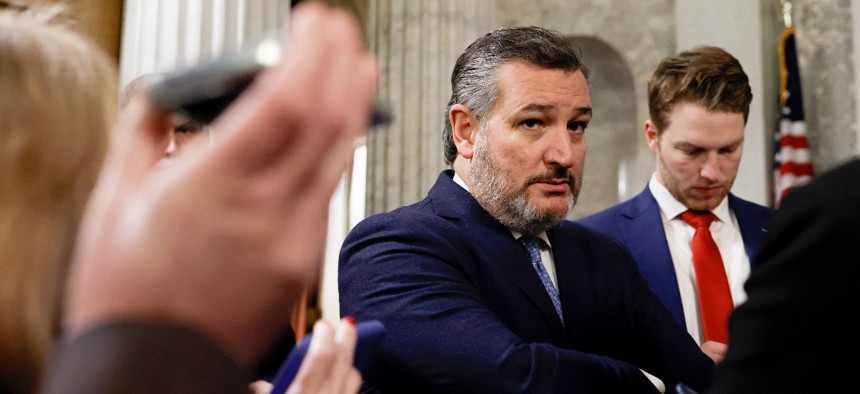Section 230 Debate Reignited as Cruz Demands Content Moderation Transparency

Sen. Ted Cruz (R-TX) speaks with reporters during a series of the votes at the U.S. Capitol Building on February 13, 2023 in Washington, DC. Anna Moneymaker/Getty Images
The Texas lawmaker is requesting details on social media and tech platforms’ content moderation and censorship practices.
Sen. Ted Cruz, R-Texas, is looking for clarity from some of the biggest social media and internet companies in how they use algorithms to select content with which users engage, primarily regarding conservative voices.
The former presidential candidate issued four inquiries to Google, Meta, TikTok and Twitter asking for detailed information about the design of their content moderation systems. Cruz asks for the scope of several operations integral to content management on each platform, including recommendation systems, distribution effects on users and treatment of political speech.
“In addition to my concerns about the addictive nature of these systems, I am equally concerned with how censorship within recommendations impacts the distribution of speech online,” he wrote in the letter addressed to Google CEO Sundar Pichai. “In a world where seven out of ten Americans receive their political news from social media, the manner in which content is filtered through recommendation systems has an undeniable effect on what Americans see, think and ultimately believe.”
Cruz specifically requested information on any blacklisting practices internet companies use to censor and monitor the content of individual accounts. As part of his inquiry, he requested that the four companies provide him with a list of all U.S.-based profiles with over 500,000 follower accounts or subscribers that were removed from recommendations, either permanently or temporarily, for a period of at least three consecutive days within the past 10 years, and the rationale as to why these accounts were suspended.
These requests sit in the discourse of Section 230 of the Communications Decency Act, a law that protects the online platforms that host user-generated content from liability over what that content entails. Debate surrounding the law circulates consistently in Congress, with Democrats generally asserting the law does not adequately incentivize Big Tech to moderate hate speech, and Republicans, like Cruz, saying it is routinely used to censor free speech, particularly against conservative perspectives.
Earlier in 2023, fellow Republican Senator Cynthia Lummis of Wyoming opined that similar transparency measures surrounding content moderation practices should be documented by social media companies and released publicly.
Legislation attempting to change Section 230’s powers has been introduced in recent years, and drawn similar controversy. The EARN IT Act was reintroduced in early 2022 and calls for reductions in liability protection Section 230 grants internet websites that host third party content.
The EARN IT Act specifically adds liability for internet providers that are found to have hosted child pornography on their websites. Critics of this bill noted that such content is already illegal under existing statute, asserting that the legislation would instead do less to protect children and more to incentivize the removal of user privacy.






